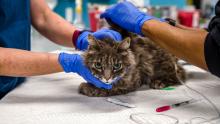Major coronavirus variant found in pets for first time
The variants of SARS-CoV-2 that keep emerging aren’t just a human problem. Two reports released this week have found the first evidence that dogs and cats can become infected by B.1.1.7, a recent variant of the pandemic coronavirus that transmits more readily between people and also appears more lethal in them. The finds mark the first time one of the several major variants of concern has been seen outside of humans.
B.1.1.7 was first identified in the United Kingdom and that’s where some of the variant-infected pets were found. The U.K. animals suffered myocarditis—an inflammation of the heart tissue that, in serious cases, can cause heart failure. But the reports offer no proof that the SARS-CoV-2 variant is responsible, nor that it’s more transmissible or dangerous in animals. “It’s an interesting hypothesis, but there’s no evidence that the virus is causing these problems,” says Scott Weese, a veterinarian at the University of Guelph’s Ontario Veterinary College who specializes in emerging infectious diseases.
Since December 2020, scientists have identified multiple variants of concern that appear more transmissible or are able to evade some immune response. B.1.351, for example, was first detected in South Africa, and a strain called P.1 was first found in Brazil. The B.1.1.7 variant drew early attention because of its rapid rise in the United Kingdom; it now comprises about 95% of all new infections there.
- Read more about Major coronavirus variant found in pets for first time
- Log in or register to post comments


